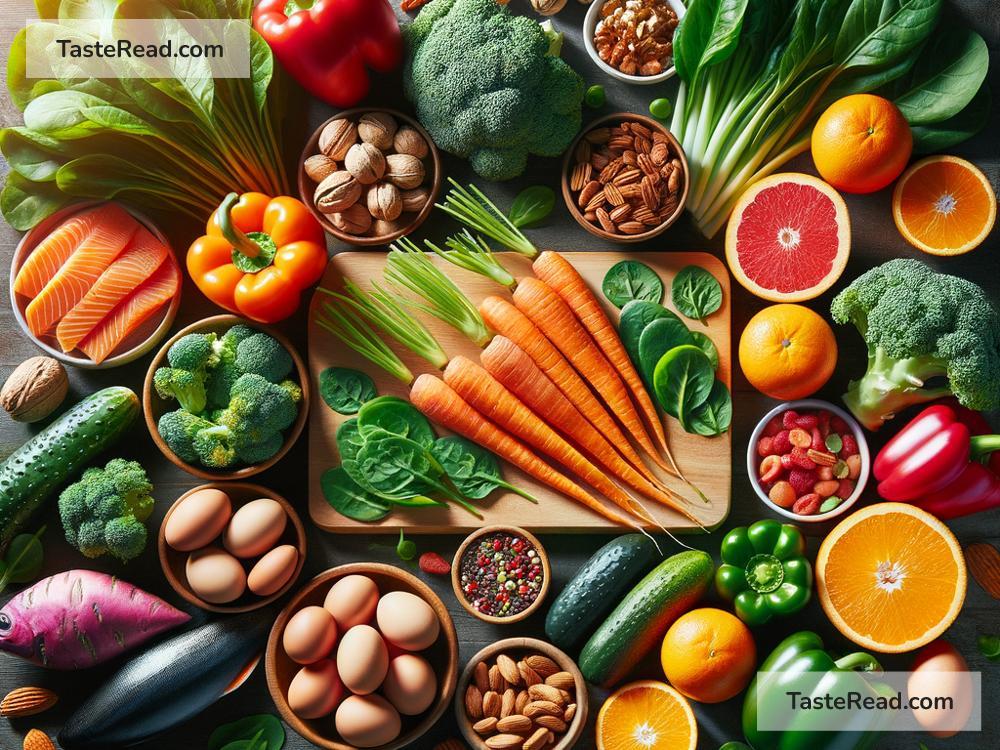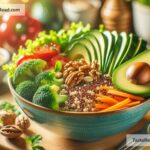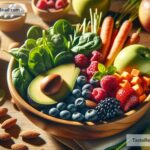The Benefits of a Balanced Diet for Eye Health: Supporting Vision
Our eyes are one of our most important senses. They help us connect with the world, plan our day, and enjoy life’s beautiful moments. But have you ever stopped to think about how your food choices can impact your vision? Eating a balanced diet not only keeps our bodies strong but also plays a key role in protecting and improving eye health. In this article, we’ll explore the connection between a healthy diet and your vision, as well as some tips on what to eat to keep your eyes healthy.
Why Is Diet Important for Eye Health?
Our eyes rely on specific nutrients to function properly and stay healthy. Over time, our vision can be affected by factors like aging or exposure to harmful elements such as UV rays or blue light from screens. A balanced diet filled with the right nutrients can reduce the risk of many eye conditions, including cataracts, macular degeneration, and even dry eye syndrome.
Just like the rest of our body, our eyes need fuel to work correctly. Foods rich in vitamins, minerals, and antioxidants provide that fuel and help fight off harmful substances that can hurt your eyes. Think of a balanced diet as one of the easiest and most natural ways to take care of your vision.
Top Nutrients for Healthy Eyes
Here are some key nutrients that support eye health and the foods where you can find them:
- Vitamin A
Vitamin A is crucial for good vision, especially at night. It helps maintain a healthy cornea (the surface of the eye) and prevents dryness. Without enough Vitamin A, you may experience blurry vision or even serious conditions like night blindness.
You can find Vitamin A in orange-colored fruits and vegetables such as carrots, sweet potatoes, and mangoes. It’s also present in green leafy vegetables like spinach and kale.
- Vitamin C
Vitamin C is a powerful antioxidant that helps protect the eyes from harmful free radicals. Free radicals can damage eye cells over time, leading to conditions like cataracts. Vitamin C also helps maintain healthy blood vessels in the eyes.
Citrus fruits like oranges, lemons, and grapefruits are great sources of Vitamin C, as are strawberries, bell peppers, and broccoli.
- Vitamin E
Vitamin E fights oxidative stress, which can damage eye cells and worsen age-related vision loss. It works alongside other antioxidants to protect the eyes from harm.
Foods rich in Vitamin E include nuts (like almonds and sunflower seeds), spinach, and avocados.
- Omega-3 Fatty Acids
Omega-3s are essential for keeping the eye’s structure healthy, including the retina. They reduce inflammation and can help prevent dry eye syndrome. Omega-3s are especially helpful for people who spend long hours staring at screens.
Fatty fish like salmon, mackerel, and sardines are excellent sources of Omega-3s. If you’re vegetarian, you can find Omega-3s in flaxseeds, chia seeds, and walnuts.
- Lutein and Zeaxanthin
These nutrients act like natural sunglasses for your eyes. They filter harmful blue light and improve visual function. Lutein and zeaxanthin are carotenoids, which means they give foods a yellow or orange color.
You’ll find them in egg yolks, corn, and leafy greens like kale and spinach.
- Zinc
Zinc plays a role in transporting Vitamin A from the liver to the retina, where it helps produce melanin, a protective pigment. Zinc also supports night vision and overall eye health.
Good sources of zinc include oysters, beef, poultry, beans, and fortified cereals.
Benefits of a Balanced Diet for Your Eyes
A balanced diet that includes these key nutrients can help you enjoy these eye health benefits:
-
Protection Against Eye Diseases: A healthy diet reduces the risk of developing conditions like cataracts, macular degeneration, and glaucoma.
-
Improved Vision: Nutrients like Vitamin A and Omega-3s keep your vision sharp and reduce dryness or irritation.
-
Strengthened Eye Tissues: Vitamins C and E protect the tissues in your eyes from damage and aging.
-
Reduced Inflammation: Omega-3s and antioxidants fight inflammation, which can cause serious eye issues if left unchecked.
-
Support for Screen Time: If you’re constantly on your phone, computer, or tablet, Omega-3s and other nutrients help combat the effects of prolonged screen exposure, such as dryness and soreness.
Tips for Eating Your Way to Better Vision
Eating for eye health doesn’t have to be complicated. Here are some simple tips to boost your diet:
- Include colorful fruits and vegetables on your plate. A variety of colors means a variety of nutrients.
- Swap sugary snacks for nuts or seeds to get healthy fats that benefit your eyes.
- Add fatty fish to your meals a couple of times a week, or take Omega-3 supplements if you’re vegetarian.
- Drink plenty of water to keep your eyes hydrated and free from irritation.
- Cut down on processed foods and junk food, as these can increase inflammation and hurt your overall health.
Final Thoughts
A balanced diet is the foundation of good health—including healthy eyes! By eating nutrient-rich foods, you’re investing in not just your vision but the quality of life your eyes provide. It doesn’t take fancy recipes or difficult diets to support your eyesight. Just adding ingredients like leafy greens, bright fruits, nuts, and fatty fish to your meals can make a big difference.
Eyes are precious, and taking care of them through smart food choices is a step towards seeing the world clearly for years to come. So, next time you’re grocery shopping or planning your meals, keep your eye health in mind—it’s worth it!


